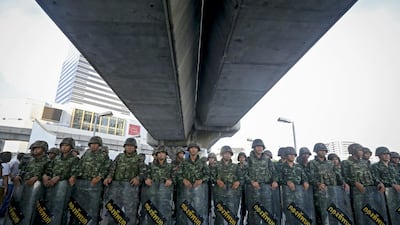Todd Pitman and Thanyarat Doksone
BANGKOK // In a chilling move apparently aimed at neutralising critics and potential opposition, Thailand’s new army junta on Saturday ordered dozens of outspoken activists, academics and journalists to surrender themselves to military authorities.
The junta, which is already holding most of the government it ousted in a coup on Thursday in secret locations against their will, said it would keep former prime minister Yingluck Shinawatra and others in custody for up to a week to give them “time to think” and keep the country calm.
Two days after the army seized power in the country’s first coup in eight years, it also faced scattered protests that came amid growing concern over the junta’s intentions. Also on Saturday, the military dissolved the senate – the last functioning democratic institution left in the country, and absorbed its legislative powers.
“Military rule has thrown Thailand’s rights situation into a free fall,” said Brad Adams, Asia director at Human Rights Watch. “The army is using draconian martial law powers to detain politicians, activists and journalists, to censor media, and to ban all public gatherings. This rolling crackdown needs to come to an end immediately.”
At least 100 people, mostly top politicians, have been detained incommunicado by the junta so far. Deputy army spokesman Col Weerachon Sukondhapatipak said they were all being well-treated and the military’s aim was to achieve a political compromise.
Weerachon said all those held have had their mobile phones confiscated because “we don’t want them communicating with other people. We want them to be themselves and think on their own.”
“This is because everybody involved in the conflict needs to calm down and have time to think,” Col Weerachon said. “We don’t intend to limit their freedom – it’s to relieve the pressure.”
In a military order broadcast at the start of the day, the junta summoned 35 more people, including politicians, political activists and, for the first time, outspoken academics and some journalists.
Among them ordered to report to the military was Pravit Rojanaphruk, an outspoken columnist for the English-language daily The Nation. In a tweet on Saturday night, Pravit was defiant, saying “the more they exercise their illegitimate power the more illegitimate they become.”
Another on the list, Kyoto University professor of South-east Asian studies Pavin Chachavalpongpun, said by phone from Japan that he would not turn himself in. He said the summons meant the junta felt insecure.
“The military claiming to be a mediator in the Thai conflict, that is all just nonsense,” he said. “This is not about paving the way for reform and democratisation. We are really going back to the crudest form of authoritarianism.”
Gen Prayuth Chan-ocha, who leads the junta, justified the coup on Thursday by saying the army had to act to avert violence and end half a year of political turmoil triggered by anti-government protests that killed 28 people and injured more than 800.
The intractable divide plaguing Thailand today is part of an increasingly precarious power struggle between an elite, army-backed conservative minority based in Bangkok and the south that can no longer win elections, and the political machine of exiled former prime minister Thaksin Shinawatra and his supporters in the rural north who backed him because of populist policies such as virtually free health care.
The army deposed Mr Thaksin in a 2006 coup. And on Friday, it detained his sister, Yingluck, who was forced from office earlier this month by a controversial court verdict for abuse of power, which she denies.
The ruling party, which rose to power in a landslide election in 2011 that was deemed fair, had insisted for months that Thailand’s fragile democracy was under attack from protesters, the courts and, finally, the army that had rendered it powerless, step by step.
Although Thailand has been calm since the coup and there is little military presence on the streets, small-scale protests against the junta have been reported in the northern city of Chiang Mai and the beach resort city of Pattaya, south of Bangkok.
In Bangkok, hundreds of anti-coup protesters took to the streets for a second straight day on Saturday, defying an army-imposed edict banning groups larger than five from gathering for political purposes. They shouted slogans demanding a return to civilian rule and waved signs outside a Bangkok cinema before moving on to Victory Monument, a major city landmark several kilometres away.
The demonstrators briefly confronted rows of soldiers and police lined up with riot shields on a road leading to the monument, with a few scuffles breaking out before most of the protesters broke away. By late afternoon, about 500 demonstrators had gathered at Victory Monument. Army and police presence was low key, and the groups dispersed before a 10pm curfew came into effect.
Several demonstrators have been detained, and rights groups have expressed grave concern over the growing repression.
“This is a dangerous precedent – people simply expressing opinions must not be penalised,” said Richard Bennett, Amnesty International’s Asia Pacific director. “The need for the military to exercise restraint is particularly crucial given that demonstrations calling for civilian rule could intensify.”
The army launched the coup after ordering two days of brief peace talks in which the country’s political rivals failed to end their deadlock. Anti-government protesters linked to Thailand’s royalist establishment had been calling for the overthrow of the government, which they accused of corruption, since November.
Several nations have condemned the coup, and the United States announced on Saturday that it had canceled ongoing military exercises with Thailand. Pentagon press secretary Rear Adm John Kirby said US law and “our own democratic principles” require the US to reconsider its long military relationship with the South-east Asian country.
The Pentagon is also canceling the June visit of US Pacific Fleet Commander Admiral Harry Harris to Thailand and is withdrawing the invitation to the commander general of the Royal Thai Armed Forces to visit US Pacific Command in June, Kirby said.
* Associated Press

